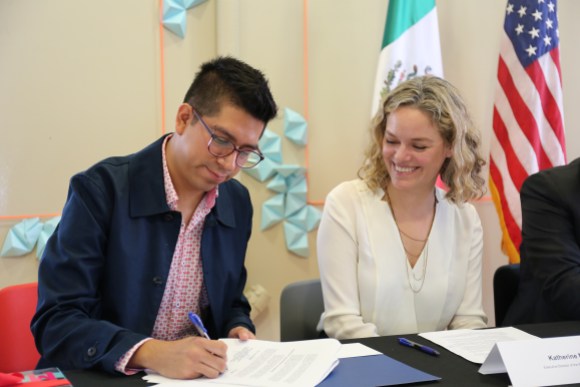
Last month, the Mexican Ministry of Culture and Wikimedia Mexico formally agreed to a long-term partnership that will help collect and preserve Mexican culture and heritage on Wikimedia projects, like Wikipedia.
The possibilities of this agreement—signed between the Mexican government agency charged with overseeing the country’s centers of history and heritage, and the independent chapter working to advance the Wikimedia movement in Mexico—are far-reaching. Mexico has an extensive and diverse history and culture, reaching back thousands of years in Spanish and dozens of indigenous languages, but much remains undigitized.
“We are excited to continue to expand Wikipedia’s free knowledge alongside one of the leading keepers of culture in my country,” says Iván Martínez, President of Wikimedia Mexico. “I genuinely appreciate the willingness and work of everyone who made this possible, and thank them all for their sensitivity, vision, and now commitment to continuing the production of free knowledge in Mexico.”
Since being incorporated in 2011, Wikimedia Mexico has been one of the most active and engaging chapters in the Wikimedia movement. Their activities include hosting Wikimania in 2015, the annual conference that celebrates Wikipedia and the movement; and a partnership with the ministry’s Biblioteca Vasconcelos Public Library, which served as a first step to the formal agreement and will be continuing, in addition to existing agreements with the Digital Culture Center (Centro de Cultura Digital), the National Film Archives (Cineteca Nacional), and the National Sound Archives (Fonoteca Nacional).
In the near future, the chapter is planning to expand this work through an advisory role in the new Cultural Database of Cultural Objects of Mexico with Wikidata, and the launch of a national photography contest dedicated to the culture of Mexico.
To celebrate the formal agreement, the Mexican consulate in San Francisco held an official signing event on 12 March. In attendance were Gemi González, Consul of Mexico in San Francisco; Alejandro Salafranca, General Manager of Information Technology and Communications of the Culture Ministry; Ernesto Miranda, Coordinator of Digital Agenda in the Secretariat of Culture; Katherine Maher, Executive Director of the Wikimedia Foundation; and Iván Martínez.
The Wikimedia Foundation signed onto the agreement to confirm support to the chapter’s commitment. Moreover, the foundation’s Partnerships and Global Reach team has been invited to participate as a way of furthering the chapter’s extensive efforts and to have a stake in supporting the partnership.
At the event, Martínez spoke about the path ahead and what it is going to mean for the participants (condensed for this format):
I cannot speak for my tens of thousands of comrades who create and curate Wikipedia’s knowledge, but in my own Wikipedia activity, two of the skills I employ most frequently are patience and resignation.
Patience comes because knowledge is commitment. On Wikipedia, for example, editors commit to its cultural creation process. Pursuing a consensus solution, finding a rare citation, or programming an automated program can take days, weeks, or even years.
Resignation is more complex. That is inspired by Argentine poet Jorge Luis Borges, who once wrote that we live in constant resignation of having to choose the books we read because life will not be long enough to read them all. And so it is with Wikipedia. My presence, and that of all the other editors on the site, will in the end be merely temporary. I’m resigned to knowing that I will never cover everything I want to.
I feel that both of these skills will be useful in this partnership as well. That patience will help me in the extensive work that lies ahead in bolstering the world’s free and open knowledge with information from the Ministry of Culture, and that resignation will help me face the fact that this important work will extend beyond all of our lifetimes.
———
Jorge Vargas, Regional Manager, Strategic Partnerships – Latin America
Wikimedia Foundation
You can also read this post on our Medium publication.

Can you help us translate this article?
In order for this article to reach as many people as possible we would like your help. Can you translate this article to get the message out?
Start translation